How much does a Tour de France bike cost?
WorldTour riders get the very best bikes and kit, but just how much would it cost to ride the same bikes?
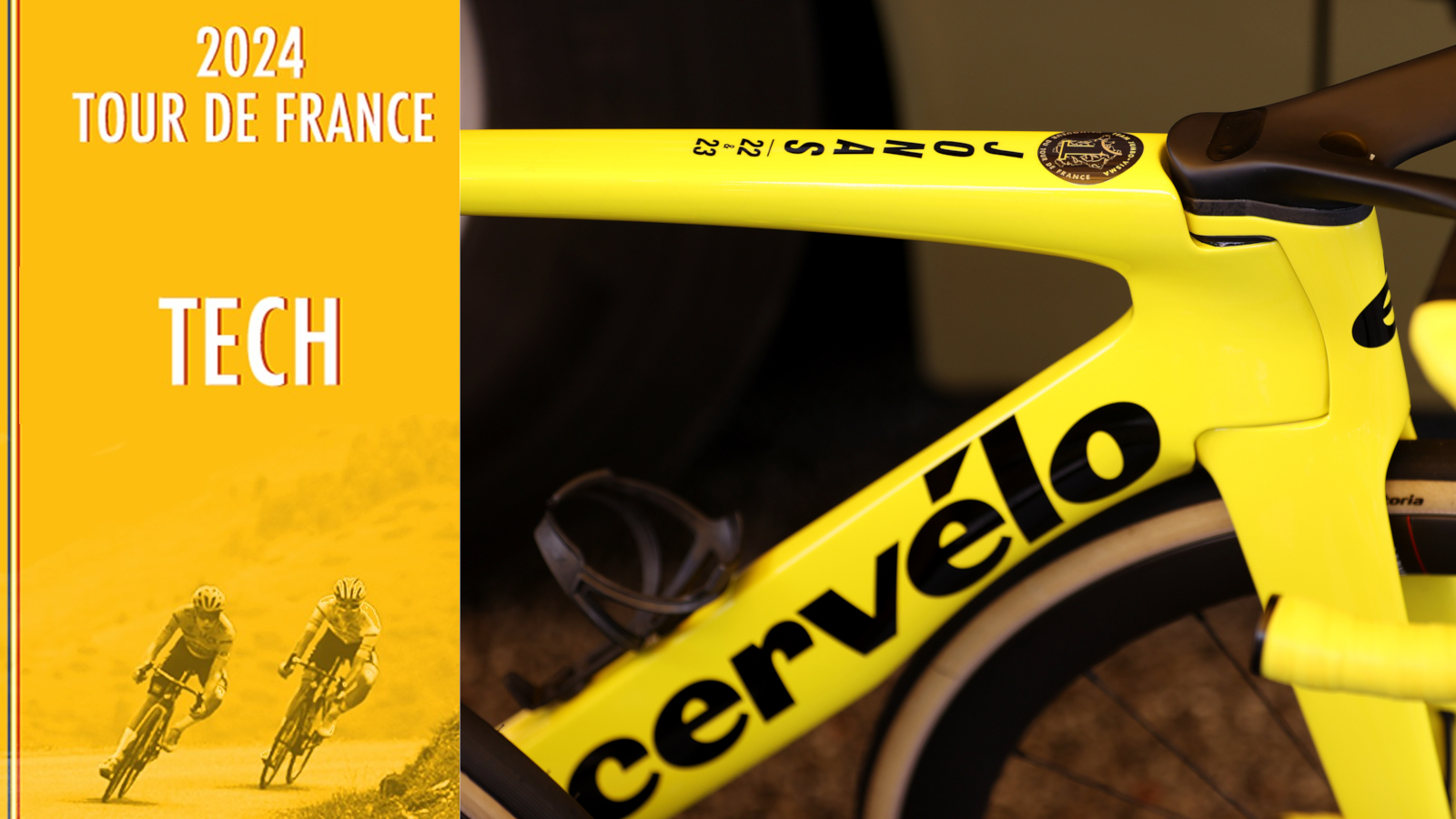
Riders in the Tour de France race on the very best bikes available. One of the perks of being a professional cyclist is getting to ride the best road bikes in the world and have them maintained to perfection by professional mechanics.
Top-end road bikes cost a lot these days, but just how expensive are they? While we tackle the broader question here, you can read our Tour de France bikes guide to see a breakdown of each squad's full equipment package if you want to know more about one team's equipment. If you want to know more about the teams in general, check our our Tour de France team guide for this year.
Naturally, the cost of different team bikes varies. Some teams ride off the peg bikes and componentry that, stock-depending, you could add to an online shopping basket and order tomorrow. This may be a dangerous proposition if you are fired up after watching an afternoon's racing and feel like treating yourself. Then there's the prototype and pro-only componentry that is issued to some teams, here things get a little trickier to work out.
Within the 2024 Tour de France, there are 19 different bike brands, each will have a slightly different pricing structure for its range of bikes. There are also three teams that ride the same brand of bikes. Those brands are Canyon, Specialized and Wilier Triestina who all supply frames to two different teams each.
If you're after a ballpark figure for the bikes being raced in the Tour. The cost of a team race bike is in the region of £9,000 - £14,000 / €10k - €15k / $11k - $16k / AU$17k - $22k.
But let's take a deeper dive into the cost of some specific Tour de France bikes, including the super expensive time trial bike class. We'll also look at who exactly pays for the bikes, whether riders get to keep their own bike, and how many bikes a team will take to the race.
Tour de France bike cost breakdown
Firstly, it's important to recognise that a bike is made up of various components. Starting with the frame and fork, there is then a groupset (or gear and brake system), wheels, tyres, cockpit components such as the handlebar and stem, and the finishing kit such as the saddle, bar tape and pedals. There are then the small parts such as the bolts, bearings, inner tubes or tubeless sealant, lubricants, and even the paint. To quantify the cost of the bike as a whole, you need to calculate the sum of its parts.
Get The Leadout Newsletter
The latest race content, interviews, features, reviews and expert buying guides, direct to your inbox!
It's also worth remembering that depending on the terrain of the stage ahead, riders will often ride different frames or use different components to improve the bike's suitability to the course. Lighter wheels might be swapped in for mountainous stages; more aerodynamic wheels will be used for flatter days, and more puncture-proof tyres might get used if there are cobbled roads or poor road surfaces during a particular stage.
To calculate the true retail cost of a Tour de France bike, we've picked a few bikes being used this year and broken down the cost of each. We've looked at some of the most well-known and popular bikes in the race, as well as a newcomer to the WorldTour peloton this year, that to a degree, bucks the hyper-expensive trend.

Soudal-QuickStep's Specialized S-Works Tarmac SL8
Belgian squad Soudal-QuickStep or the 'Wolfpack' as they like to be known due to their fighting team spirit race on the Specialized Tarmac S-Works SL8. A bike which launched at last year's World Championships. It's fairly easy to work out the team bike cost as a lot of the components come from Specialized themselves or its subsidiary brand Roval and are easily available to purchase. Interestingly, and very unusually the newest SL8 model at launch was actually cheaper than the outgoing SL7 model the team had used. The 'S-Works' name refers to Specialized's top spec frames and if you want to ride the same as the pros, you'll need to spend some extra cash for an 'S-Works' model over the regular Tarmac SL8.
Aside from the paint job which is specific to the team, the S-Works Tarmac SL8 can be ordered off the peg from the brand's website for £12,000 / $14,000 / €14,000.00 / AU$19,900 with the same Shimano Dura-Ace groupset, Roval Rapide carbon fibre integrated handlebar, seatpost and tyres the team normally use and with Roval Rapide CLX II carbon wheels which are used by the team depending on the stage and terrain.
There's one component of the team's equipment package that isn't quite as easy to get your hands on. The team are currently racing on the Roval Rapide CLX II Team wheels which cost £3,000 / $3,800 / €3,700 / AU$6,000. These wheels are available to buy but are limited to 1500 sets worldwide. What we don't currently know is how many have been issued to pro teams. The team edition wheels which omit paint from the hub shells to save weight are £500 / $1,000 / €1,000 / AU$1,600 more than the standard CLX Team II wheels.
Approx total cost: £12,500 / €13,000 / $14,500 / AU$21,500
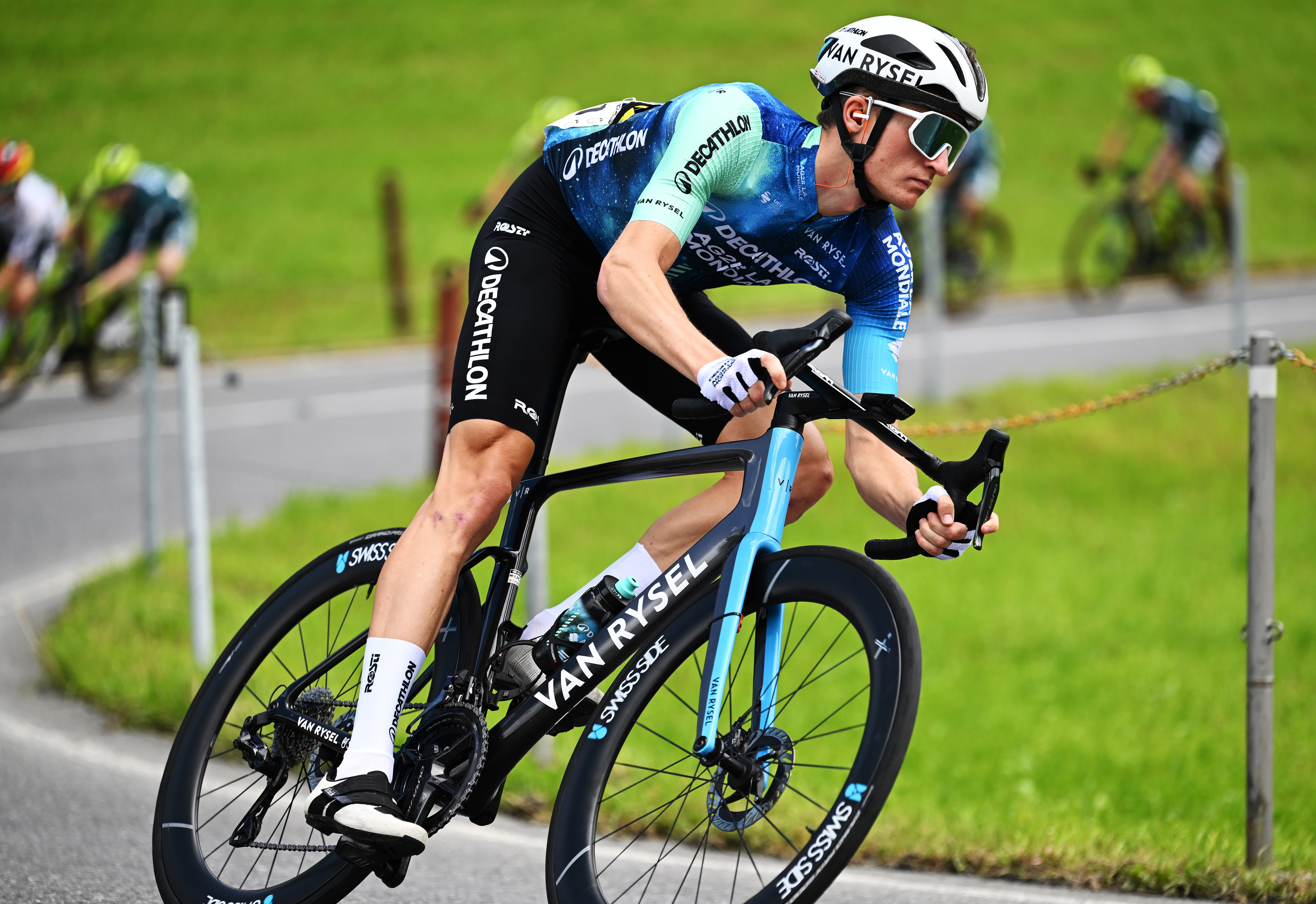
Decathlon–AG2R La Mondiale's Van Rysel RCR
French team Decathlon AG2R La-Mondiale began 2024 with a totally new equipment package, switching from BMC and Campagnolo equipment to Van Rysel bikes, a part of the Decathlon retail family.
The team has enjoyed a blistering start to the year, taking multiple victories and the Van Rysel RCR road bike they race on has been popular from the off.
The Van Rysel RCR is unique in the WorldTour and Tour de France peloton as being available to buy in exactly the same spec as the team race on for under £10,000. We think this makes it one of, if not the cheapest bike in the race. There you have it, a Tour de France race bike and change from £10,000 – a bargain if ever there was one.
The team races on the Van Rysel RCR carbon fibre frame, the bikes are built up with Shimano Dura-Ace electronic groupsets, SwissSide Hadron carbon wheels in a range of rim depth options and Continental GP5000 tubeless tyres. The bike's handlebars and stem are Italian Deda integrated units. We also have it on good authority the team might be using some new aerodynamic tyres from team sponsor Continental during the race.
We think that the team have one of the fastest, and best value equipment packages in the WorldTour. Apparently, Van Rysel engineers tested a range of competitor bikes and the RCR stacks up very well aerodynamically against the competition. Jean-Paul Ballard the SwissSide CEO brings his experience from Formula One to the cycling world and the team is surely benefiting from this. If you absolutely had to buy a fast Tour de France race bike, this one would probably offer the best value compared to the competition.
Approx total cost: £12,500 / €9,000 / $10,999 / AU$ NA
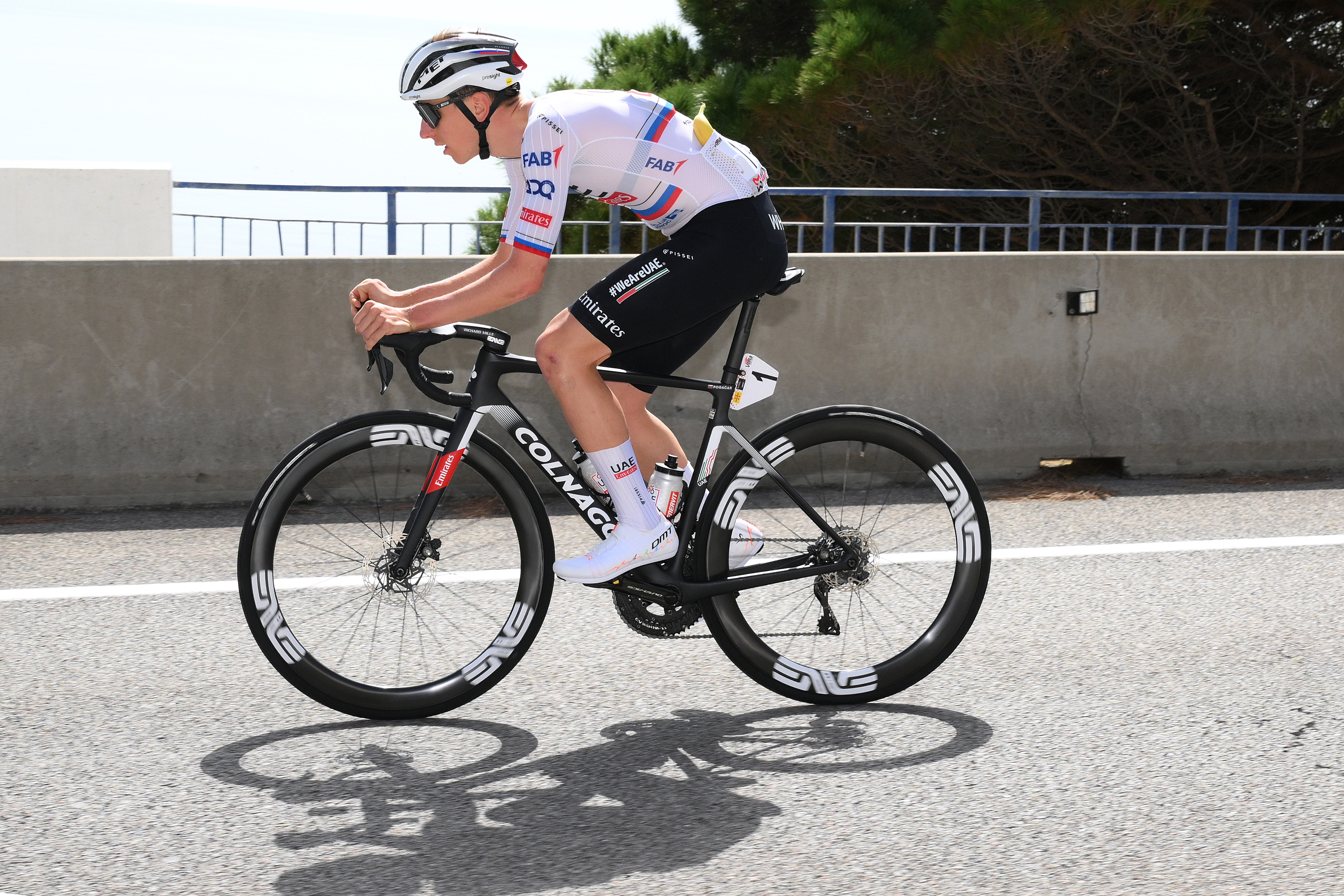
Tadej Pogačar's Colnago V4RS
Tade Pogacar is the overall race favourite this year after already taking overall victory at the Giro d'Italia just a few weeks ago.
His UAE Emirates team races on Italian Colnago V4RS bikes, but it isn't possible to purchase Tadj Pogacar's exact bike spec off the shelf, which makes things trickier. You could buy the individual parts that make up the team's bike, and get really close to the same build the team use, but may come unstuck trying to get your hands on his handlebars.
On the Colnago bikes website bike builder, the closest you can get to the Slovenian aces builds comes out at £14,143 / $17,919 / €16,763 / AUD $26,849.
This is with the same frame, Dura-Ace electronic groupset and integrated power meter. But instead with a Colnago CC.01 cockpit, not the Enve integrated handler and stem the team uses. The bike also gets specced with Enve SES 3.4C wheels, not the deeper profiled Enve SES 4.5 wheelset Pogacar tends to use.
Utah-based composites brand Enve provide the wheels and integrated handlebar on Pogacar's bike. The handlebars in particular will be tricky to get hold of right now and seem to be a custom version of the handmade SES AR handlebar which retails for a whopping $1,200, that's the cost of some bikes. The curve of Pogacar's handlebar drops is different to the stock bar offered on the company's website leading us to think this is a custom team-only option, at least for now.
It also isn't possible to buy the bike with the exotic Carbon-Ti chainrings and disc brake rotors the team uses to save weight. The 55-tooth Carbon Ti CarboRing chainring costs €249.00, whilst the smaller 40-tooth Inner chainrings cost €186. The X Rotor discs cost €185 each and weigh 80 grams in a 160mm size. We have subtracted the rough cost of the Dura-Ace equivalent parts to work out the total cost of Pogacar's build and used component RRP's
| Component | Price |
|---|---|
| Colnago V4RS frameset | £5,000 |
| Enve SES AR handlebar *Team edition | From £947 |
| Shimano Dura-Ace groupset | £3,579 |
| Power meter chainset upgrade | £650 |
| Enve SES 4.5 wheelset | £2,249 |
| Carbon Ti CarboRing's | £367 |
| Carbon Ti X Rotor discs | £312 |
| Continental GP5000 S TR tyres | £159 |
| Shimano Dura-Ace R9200 pedals | £235 |
| Prologo Scratch M5 | £186 |
| Extras (bar tape, computer mount, bottle cages, etc) | Approx £200 |
| Total | £13,479 |
There's also the additional cost of bar tape, computer mount, bottle cages, and the probable addition of ceramic bearings to add on. We'll estimate an approximate cost of around £200 for all that.
We'll waive the added cost of the bottles since that's peripheral to the bike itself. Likewise his Wahoo computer.
Approx total cost: £13,479
Currency conversion as of June 2024: €16,087. / $17,186 / AUD $25,794
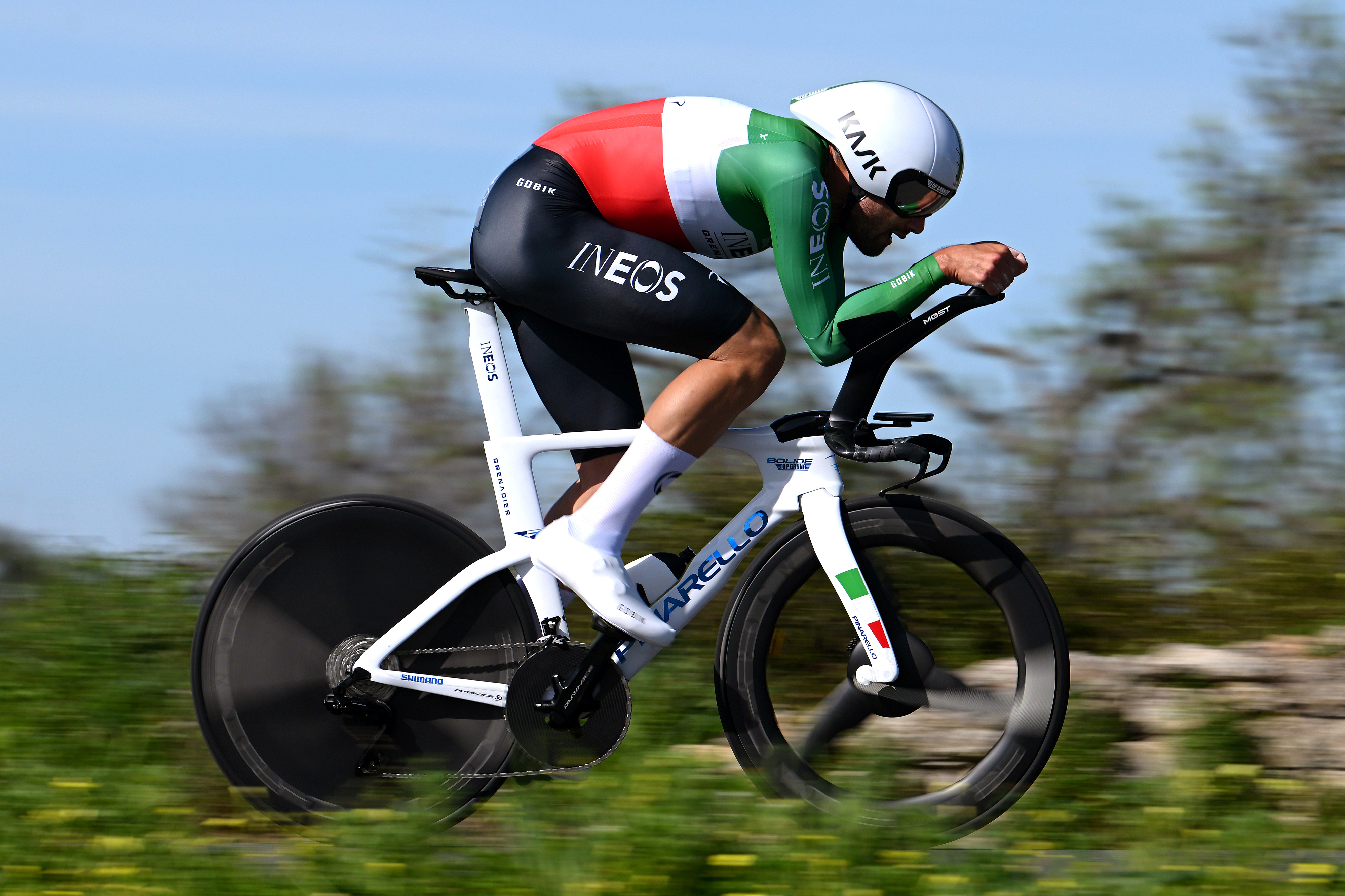
The most expensive Tour de France bike? Ineos Grenadiers' Pinarello Bolide F
There's no greater arms race in cycling than in the world of time trialling, and as such, it's here that the money really starts to stack up. Nowadays, we have such a deep understanding of aerodynamics, rolling resistance and drivetrain efficiency, and how they all affect the speed at which a rider will travel for a set power. Therefore, the time and research going into developing time trial bikes, components and clothing is growing exponentially as the available gains get smaller and smaller. The result is the cost of the products that are created are pretty damn expensive.
The bike in question is the Pinarello Bolide F; launched shortly after the Tour de France in 2022. From the PinarelloStore website, it is priced at £12,000 for a frame alone or a staggering £30,000 with custom-printed time trial extensions. You can bet that most Ineos riders will take the more expensive option.
On top of this, based on recent races, riders are likely to use a pair of wheels from Princeton Carbonworks: the Blur 633 V3 rear disc wheel ($2,950) and Mach 7580 TSV2 front tri-spoke ($2,850). Total cost $5,800 (Approximately £4,658 after conversion).
The team has also used a Classied hub equipped Parcours rear disc wheel this year to further increase 1x gear range, accommodate the dinner plate-sized front chainrings riders are using now and help improve drivetrain efficiency. This Classified hub gear-enabled Parcours Disc2 wheel retails for £1,099 / $1,449 / €1,429. But will then need to be paired with the Classified Powershift wireless hub system at £1,096 / €1,299 / $1,388. We expect that the terrain of a time trial will mostly determine when the team uses this option. We will price up with the more expensive Princeton wheelset option for the final total.
They'll also need a groupset, and it makes sense that they'll use the same Dura-Ace R9200 as found on their road bikes. When factoring in a power meter, that'll cost in the region of £4,200, albeit with small differences based on the time-trial-specific brake levers and shifters. They'll also almost certainly swap the 2x chainset and front derailleur in favour of a 1x aero-optimised chainring. We calculate this to be around £200 cheaper than a 2x setup, so will deduct this from the total.
Beyond these main components, there are other 'finishing' components to add on. Continental GP5000 S TR tyres will cost £198 for a pair. There's also a saddle, for which we'll use the Fizik Transiro Mistica KIUM saddle - all £165 of it - as used by the team's best time triallist Filippo Ganna, plus roughly £50 for bar tape, chain lube, tubeless conversion. We also acknowledge there may be new or secret prototype parts that we don't even know about yet, but this is a good estimation.
Approx total cost: £39,071
Approx currency conversion (June 2024): €58,127 / $62,110 / AU$93,266
A new rival to the Pinarello price tag
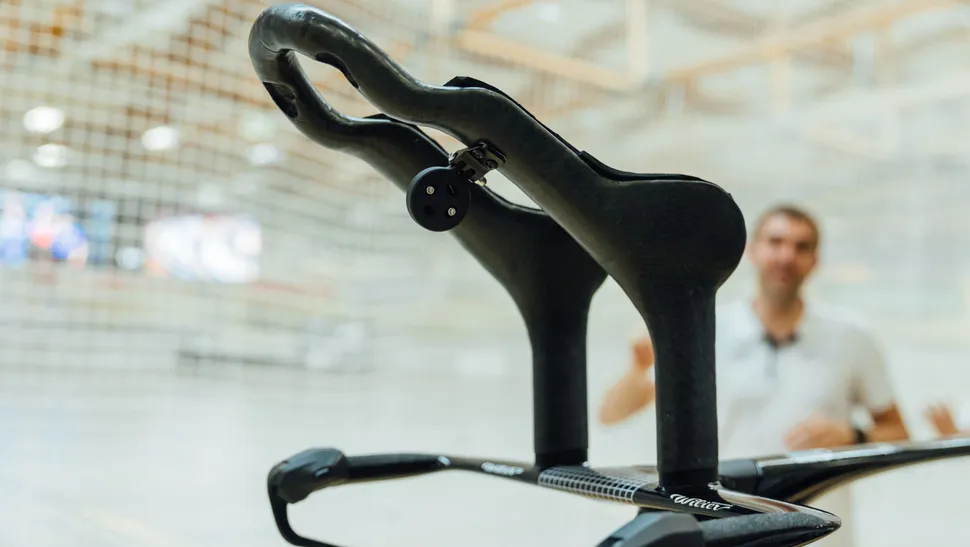
Wilier Triestina released a new time trial bike recently that rivals the Pinarello offering in price. The bike in question is the new Supersonica SLR TT.
The new bike has been developed alongside time trial ace and Groupama FDJ rider Stefan Kung after more than 50 hours of CFD computer simulations. Wilier offer a custom handlebar extension option to non-pro riders too, so if you splash the cash you can enjoy close to the pro treatment.
Price-wise, the Supersonica frame kit is €9,000, but like the Pinarello Bolide F, add on custom tri-bar handlebar extensions and a Dura-Ace build complete with Miche disc wheel and tri-spoke and the price gets bumped up to €27,400. You could easily head north of €30,00 here with upgrades like ceramic bearings and other aero components optimisations.
Approx total cost: £27,400
Approx currency conversion (June 2024): €32,455 / $34,673 / AU$52,095
How many bikes do teams have at the Tour de France?
Most Tour de France riders will usually have two bikes available to them on any given day, with key riders having even more. Some teams will also have two different types of bike - one that is lighter in weight for the climbing days, and another that is more aerodynamic for the flatter, faster days. They will also have one or two-time trial bikes per rider for the time trial stages.
If you extrapolate that out to eight riders per team and take into account bikes that have been crashed out, it's not uncommon for teams to have 60 framesets and over 100 wheelsets at race (and hundreds more back at the team's service course). Hunt Bike Wheels previously confirmed to Cyclingnews that it supplied 115 wheelsets to Qhubeka Assos for the 2021 Giro d'Italia to give you an idea.
Can you buy a Tour de France bike?
The sport's governing body, the Union Cycliste Internationale (UCI), has a rule that means any product used in competition must be made available for public sale. Article 1.3.006 of the UCI Technical Regulations states:
"Equipment shall be of a type that is sold for use by anyone practicing cycling as a sport. Any equipment in development phase and not yet available for sale (prototype) must be subject of an authorization request to the UCI Equipment Unit before its use. Authorization will be granted only for equipment which is in the final stage of development and for which commercialization will take place no later than 12 months after the first use in competition."
To simplify, this means teams can only use technology that is available to the public or prototypes of tech that is planned to make it into the public domain within 12 months. Therefore, you can indeed ride the exact same bikes as the WorldTour pros… just know you'll need deep pockets.
If you want to go a step further and ride a bike that has literally been ridden in the Tour de France, then this is possible too. Websites like Bike Room sell off teams' old bikes at the end of the season once they've been finished with.
What do Tour de France teams pay for their bikes?
This depends on the sponsorship deal the team managed to strike with manufacturers of the frames and components, but for the most part, teams will not pay a single penny for their bikes.
Understandably, we're not privy to the ins and outs of these commercial negotiations, but the rough details are no big secret. The bike industry is rife with brands vying for attention, and there's no bigger stage than the Tour de France. Be they bike brands, kit manufacturers or shoe suppliers, they all want to put their products in front of a worldwide audience, and they all have something to offer that the team needs.
The types of sponsorship agreements vary greatly by team, usually dependent on the team's success - or likelihood thereof. A winning team is better publicity, after all.
Some deals will be for the frameset alone, meaning the team needs to head elsewhere for a supply of wheels, groupsets and everything else. Others will get complete bikes supplied by the brand.
In addition, some sponsorship agreements are a simple handover of product in return for the publicity it will garner, while others are fully integrated technical partnerships where the two parties work together to innovate, develop and market their products, like the AG2R Decathlon La Mondiale setup this year.
Moreover, rather than paying for the bikes, some deals will actually also involve a cash injection alongside the provision of equipment, meaning these teams are given bikes and money. Hands up anyone who's ever left a bike shop richer than when they entered...? No, nor us.
Do pro cyclists get to keep their bikes?
Usually not, no. In almost all cases, the bikes are provided to the team by a brand by way of sponsorship. The brand will supply enough bikes to supply the team for the season, and then at the end of the season - or contract period, which often spans a few years - the bikes will be returned.
Exceptions are sometimes made for key riders upon retirement, or bikes that are ridden to special victories, but in most cases, the bikes are returned to the brand and then sold, gifted, or in some cases even discarded.

Josh is Associate Editor of Cyclingnews – leading our content on the best bikes, kit and the latest breaking tech stories from the pro peloton. He has been with us since the summer of 2019 and throughout that time he's covered everything from buyer's guides and deals to the latest tech news and reviews.
On the bike, Josh has been riding and racing for over 15 years. He started out racing cross country in his teens back when 26-inch wheels and triple chainsets were still mainstream, but he found favour in road racing in his early 20s, racing at a local and national level for Somerset-based Team Tor 2000. These days he rides indoors for convenience and fitness, and outdoors for fun on road, gravel, 'cross and cross-country bikes, the latter usually with his two dogs in tow.